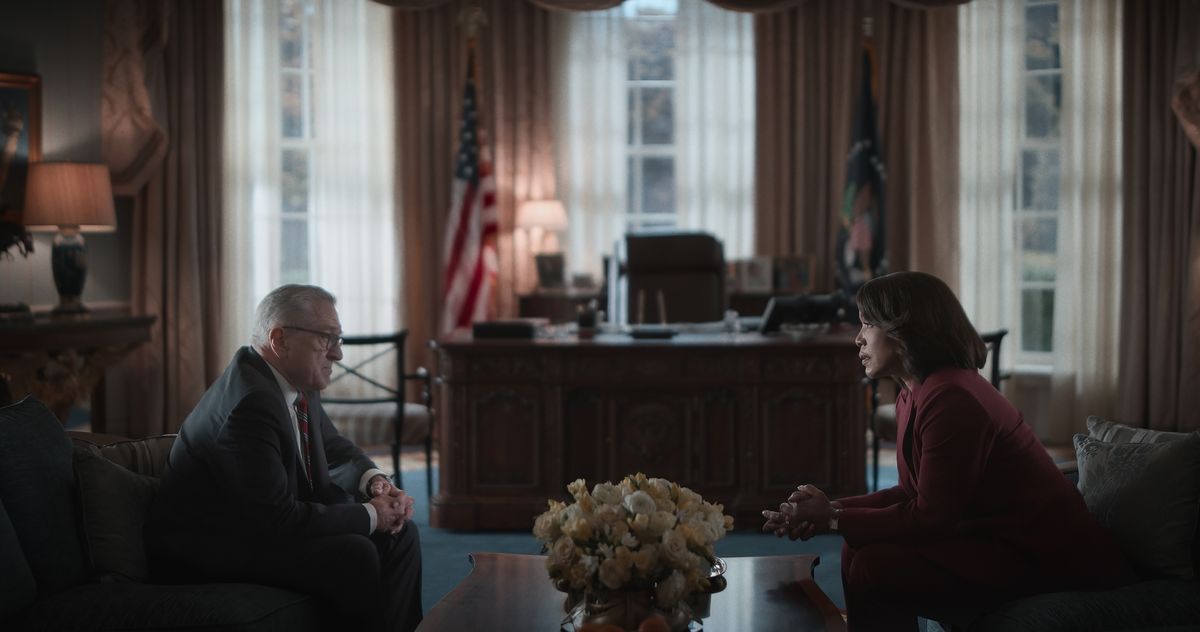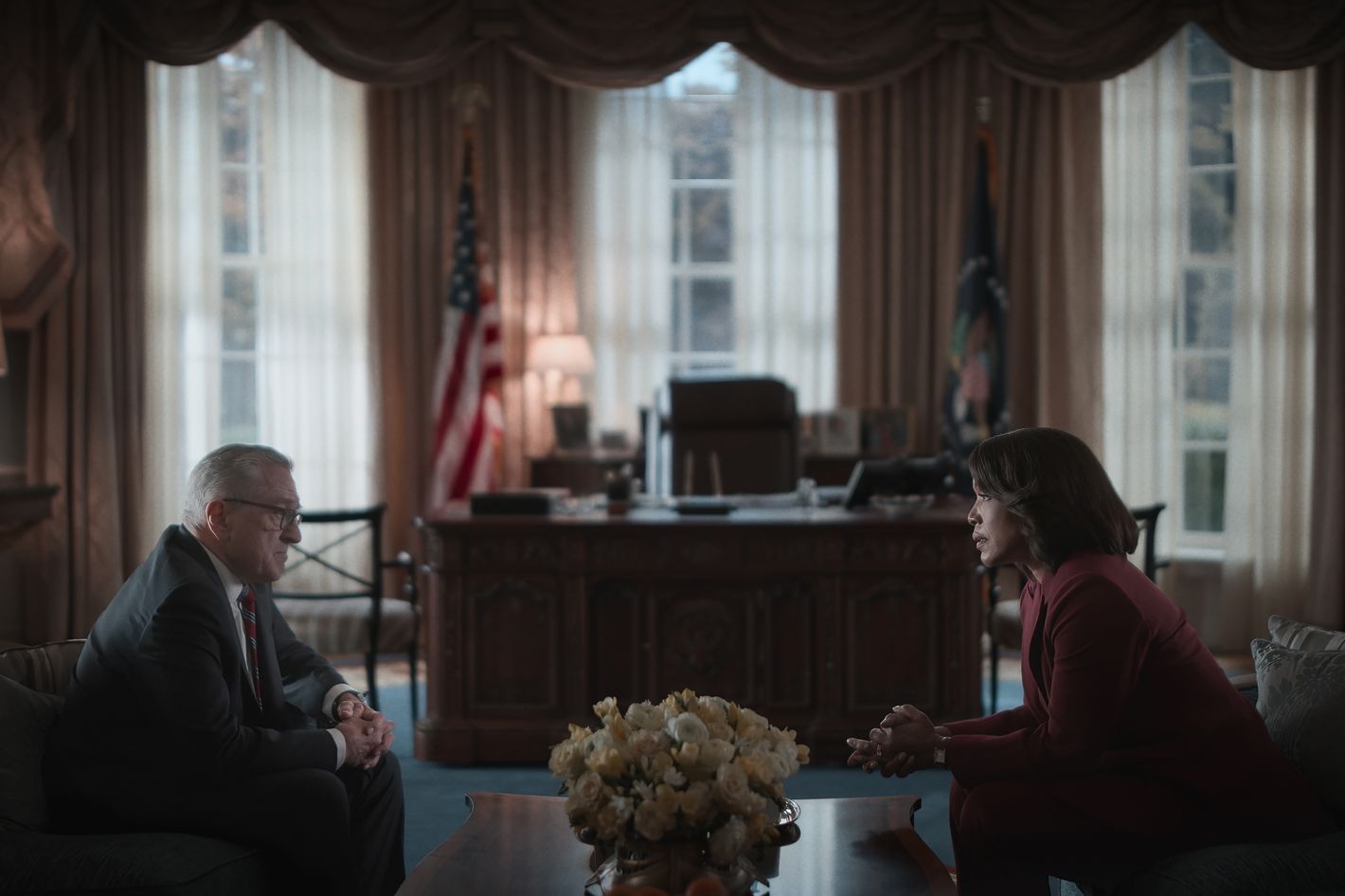Not Now, Zero Day
A vestigial limb of the Resistance era, the Netflix political thriller clings to a version of the status quo that no longer exists.


Minor spoilers follow for the limited series Zero Day, all six episodes of which premiered on Netflix on February 20.
Zero Day is a show meant for an era that did not come to pass after November 5, 2024. It’s impossible to watch the new Netflix limited series without thinking that co-creators Eric Newman, Noah Oppenheim, and Michael Schmidt imagined it as a reassuring pat on the back to be released in the first few months of another Democratic Party–controlled term. Even if the show were narratively inventive or spectacularly acted, neither of which it is, the story of an elderly former president who might be suffering from debilitating dementia but hides it after a cyberterrorism attack to maintain his superpowerful position defending the U.S. from myriad attackers (“radical leftists,” “tech types,” and politicians who comprise “the enemy within”) is an astonishing display of liberal hubris and immediately irrelevant. We’re already watching our elected leaders dismantle the country before our eyes; whatever propaganda Zero Day comes up with doesn’t hold a candle to what we’re now living through. Through that lens, the series is an ouroboros of self-congratulation, and all that ego keeps it in the realm of particularly ill-timed make-believe.
Zero Day’s centrist fantasy turns on former president George Mullen (Robert De Niro, channeling all his anti-Trump spite into a frown-forward performance), who spends his days swimming and jogging with his golden retriever, wearing U.S. military swag around his sprawling country estate, and ignoring deadlines for his long-gestating memoir. When an unknown group of hackers shut down America’s power grid and communications systems for a full minute, leading to more than 3,000 deaths nationwide in what comes to be known as Zero Day, current president Evelyn Mitchell (Angela Bassett) approves putting the Constitution on pause so the Zero Day Commission can do whatever it needs to do to capture the perpetrators, and insists that Mullen lead it. Yes, he walked away from the presidency after only one term, but he’s a former prosecutor and a Vietnam War veteran who worked in intelligence, and Mitchell, who is brusquely willing to use violence against foreign powers, even if they weren’t responsible for Zero Day, tasks him with getting to the bottom of the attack. The tools at Mullen’s disposal: Police and federal agents can arrest citizens without evidence and search their homes without warrants, throw them in black sites, and torture them legally. After some brief initial concerns from Mullen about the legality of all this before he zealously embraces the position, Zero Day ultimately suggests that all of this stuff is necessary and justified, because how else are you going to capture bad guys? The American-exceptionalism Kool-Aid, it’s flowing!
To sell Mullen’s character as immensely popular with all Americans, Zero Day fashions him as a fit and firm politician whose no-nonsense leadership transcends the red-state, blue-state divide. He might have made some mistakes in the past, like with his addict son who died of a drug overdose, but he’s determined to be the man the country needs, a role Zero Day tells us he’s uniquely suited for because he chastises protestors for not letting cops do their jobs and convinces them to give him a standing ovation on the strength of phrases like “We’re Americans.” Shaming people for having dissenting opinions is something Mullen does often, which Zero Day loves using as teachable moments for the audience.
There’s just one problem: Mullen is seemingly losing his grip, and he’s hiding it from everyone, including his congresswoman daughter, Alex (Lizzy Caplan); his former chief of staff, Valerie (Connie Britton); and his bagman, Roger (Jesse Plemons), who grew up with his children and has a shady reputation. Mullen is beginning to see people who aren’t there. He keeps hearing the Sex Pistols song “Who Killed Bambi?” at an excruciatingly loud volume. And he doesn’t remember employees who have worked for him for years, or the combination to his safe with national secrets inside, or the incredibly important intel he was told about who committed Zero Day. The series communicates this loss of faculties through a droning musical cue, glaring yellow lighting, and blurry edges around both Mullen and his perspective for just long enough to make us think that, Well, certainly Mullen will do something about this because we’ve been told he’s so virtuous. Aha! Joke’s on us, because Mullen hides this discombobulation for a number of episodes (like when he hauls in a conspiracy-theorist commentator played by Dan Stevens, and personally oversees his torture). Eventually, someone raises a theory about what could be going on with Mullen that would serve as an explanation for his erratic decision-making. But the series drops that suggestion barely an episode after raising it, and digs in its heels about how all this — Mullen lying about his symptoms, embracing enhanced-interrogation techniques, and using the country’s intelligence organizations for missions with only half-baked intel — is actually what leadership looks like. America, hoo-rah, etc.
Like so many other neoliberal political series — cough, The Diplomat — there’s also a ton of wish fulfillment here. Matthew Modine plays the Republican-coded Speaker of the House who hates the fringe elements of his party, including “white nationalists ranting about being replaced” and “the delusional that think an election is open to interpretation.” He may be evil, Zero Day says, but at least he’s decorous. There’s an Israeli Mossad agent who is the only person Mullen can trust, especially because he insults the Russians. Gaby Hoffmann dons an Elon-like black baseball cap to play a social-media billionaire who eventually gets her comeuppance for trash-talking government employees as “severely limited in their actual talents.” Clark Gregg plays a Jeffrey Epstein–esque character who simply disappears before the show can grapple with his real-life inspiration’s alleged connections to politicians on both sides of the aisle. Interchangeable white male actors play the series’ leftist punching bags, veterans who got radicalized after their tours overseas; there’s no sympathy for their probable PTSD and feelings of abandonment and frustration for serving in forever wars. Instead, Zero Day has a real “shut up and be a patriot” energy, with numerous characters’ arcs boiling down to an appeal for centrism as the only reasonable choice, and don’t we all want to be reasonable?
The series’ final episode features a supposedly galvanizing speech about how “the way to solve our problems is to look for common good. Not wins. The way forward is to confront hard truths. Not hide from them,” all of which is very aspirational, inspirational, and heartening. It’s also complete nonsense, because Zero Day has absolutely no suggestions on how to get any of this done. (Aside from the aforementioned torture, which successfully shuts up Mullen’s loudest critic.) Mullen is told over and over again that he doesn’t understand the world now — how entrenched the political divide is, and how broken our democracy has become — and that feels like a genuine reflection of our reality, and how unbreachable the schism between right and left feels. But Zero Day then suggests that the only thing a political leader needs to do to right this country’s wrongs is “your best,” which is the exact kind of simplistic gibberish that has no current relevance.
Mullen isn’t currently in office on Zero Day, yet the miniseries treats him so thoroughly as the de facto president that the plotting feels that much goofier when it doesn’t back up this character’s supposed virtue with any political action or policy. He doesn’t advocate for building a coalition of allies, or for meeting voters’ concerns about corporate meddling in governance, or for a vision for the future that doesn’t feel like recycled pull-yourself-up-by-your-bootstraps drivel. Instead, Mullen becomes one of the most trusted people in this country based on a cult of personality, a carefully curated image that he expects the American public to accept because he tells them so. With that uncritical treatment of a man whose most defining characteristic is his aura, Zero Day falls exactly into the trap that it’s ostensibly warning its viewers against. As a vestigial limb of the Resistance era, Zero Day clings to a version of the status quo that no longer exists, and while its insistence that one good speech from one good man can return us to normalcy isn’t the series’ biggest error, it is its most naïve.
Related








